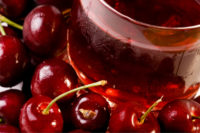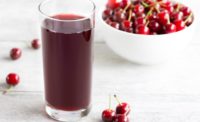Cheerful Cherries

When one thinks of health foods, however, cherries do not immediately come to mind. However, cherries contain a variety of nutrients including dietary fiber, heart-helpful beta-sitosterol and antioxidants. For example, using the ORAC (Oxygen Radical Absorbance Capacity) score for a food's antioxidant capabilities, cherries are among the 10 highest fruits reported in tests by USDA's Agricultural Research Service (ARS). Some 3.5 ounces of sweet cherries have an ORAC score of 580, which is similar to citrus fruits, but much less than that of berries.
Antioxidant compounds in the fruit include phenols such as flavonoids, vitamin C, the anthocyanin fruit pigments, ellagic acid, quercetin, and even melatonin, a compound of dietary supplement fame. Melatonin is a particularly useful antioxidant in that it is both water- and oil-soluble.
For further information on fruit and health, the Washington State Fruit Commission's (Yakima, Wash.) website offers the following links:
- www.aboutproduce.com
- www.5aday.com
- www.usda.gov/cnpp
- www.nal.usda.gov/fnic
- www.eatright.org
- www.nejm.org
- www.nal.usda.gov/fnic/foodcomp
- www.cdc.gov/od/oc/media
- www.pma.com
Lastly, if your office cubicle environment is getting you down, visit www.nwcherries.com/camera2.html, which provides a real time view of a forest of cherry trees.
For more information:
Eric Patrick at 509-453-4837
epatrick@wastatefruit.com
www.nwcherries.com
Washington State Fruit Commission Write in 404
Looking for a reprint of this article?
From high-res PDFs to custom plaques, order your copy today!





